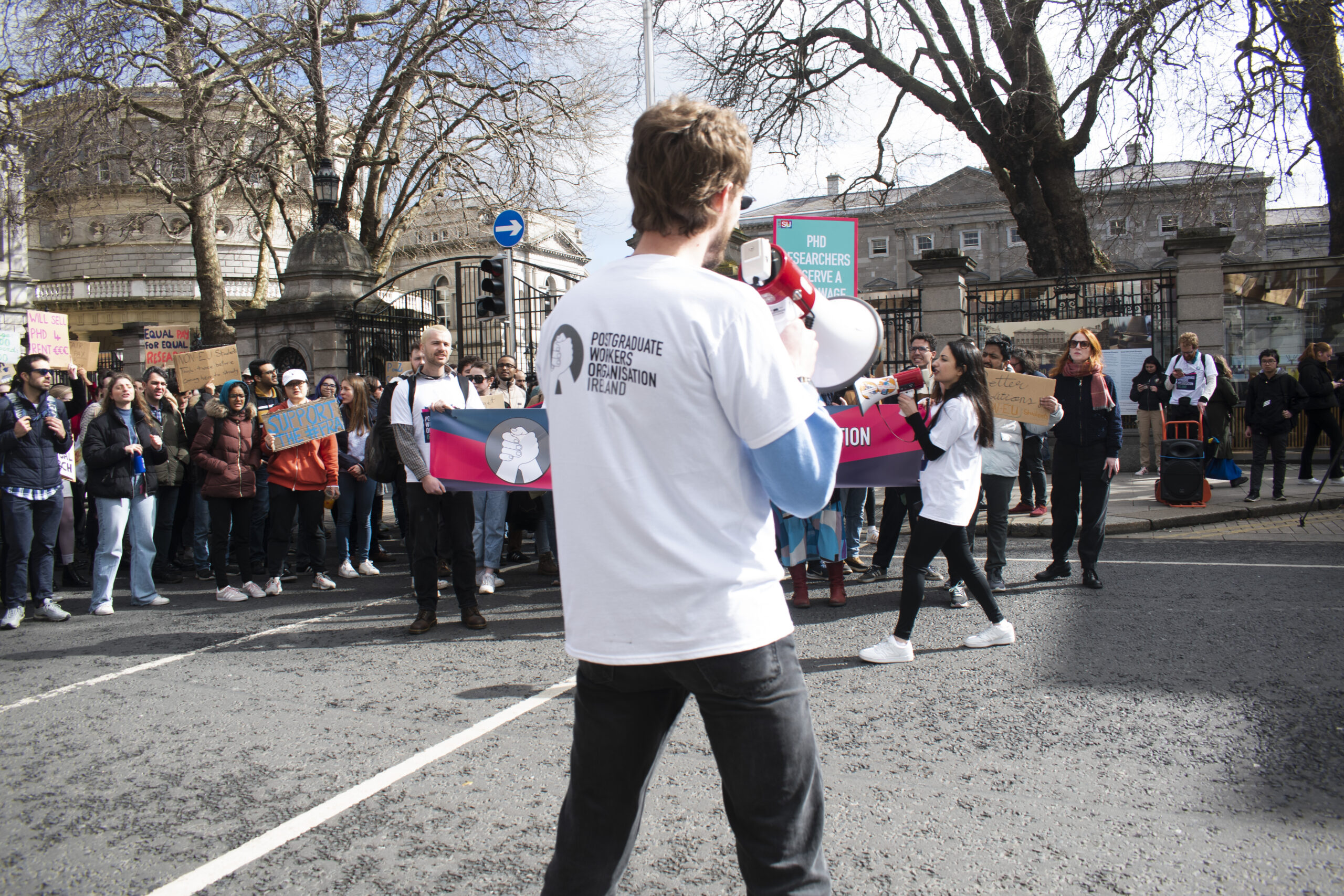Hundreds of postgraduate researchers marched on the Dáil on Thursday to protest for an increase in the PhD stipend as well as employment rights under the law.
The protest, organised by the Postgraduate Workers Organisation (PWO), the product of a recent merger of the Postgraduate Workers Alliance (PGWA) and the PhDs’ Collective Action Union (PCAU), saw hundreds gather in front square before marching down Nassau street to the Dáil with chants including “workers not students”, “Simon in your ivory tower, this is called people power” and “PWO power”.
Speaking to The University Times at the protest, member of the Trinity branch of the PWO Shauna O’Donohoe said: “We’re here because we want to make it loud and clear to the government that we are workers. We’re not students”.
“We do vital research, we demonstrate, we teach. We do supervisory work of undergraduate students and postgraduates. Yet the best case scenario is that we earn 22 per cent below minimum wage, which is €7.88 an hour and it’s not good enough”, she added.
“We would like to see a stipend increase to a living wage”, she said, “but an employment-based model is the end goal because that unlocks all the issues faced by postgraduate researchers in terms of sick pay and PRSI contributions”.
Also speaking to The University Times, PhD researcher in Maynooth University Bana Abu Zuluf added that “PWO was the reason why the national review for PhD supports actually started” but that they “have no guarantees that any of the recommendations will be implemented”.
“We are aware that there is a review in action at the moment, but we are not aware of any guarantees that the implementation will happen immediately for the start of the coming year. It is very important for us that the government and the Department of Higher Education knows that we are eager that this be implemented as soon as possible.”
“PhDs are suffering”, she said. “They know the solution, it is recommended in the Fair Research Agreement that we submitted to them, so they should be aware of what our demands are. We are hoping that they agree to our demands and that we get workers rights and that they raise our stipends”.
Eoghan Ross, a member of the National Committee of the PWO, expressed to this newspaper that “the state of things in Irish research are appallingly cruel and barbaric”.
“There is absolutely no reason that people who are conducting essential research should be treated so poorly that they’re not even afforded what is deemed to be the minimum amount of money to survive.”
He added: “Over the course of the pandemic, it was PhDs and postdoctoral researchers who were doing the vast majority of work in labs around Ireland. They were some of the first people who were brought back into the workforce because of the necessity that they had to understand what was going on, and they were not even being paid minimum wage”.
“Back when the stipends were set in the early 2000s, the stipend was about on par with the living wage, which today we are vastly behind. If Ireland wants the research sector to continue to grow and thrive, they need to take us seriously, listen to what’s being said, and acknowledge that PhDs are driving our own paths, choosing our own research and learning things for ourselves”.
“We are not being taught, we are not students, and we need to be acknowledged as such”, he finished.
Addressing the crowd at the protest, member of the National Committee and the Trinity branch of the PWO Shaakya Anand-Vembar said that she is “tired of having two jobs on top of [her] PhD in order to pay rent”.
“I will not have any savings when I am done with my PhD, and what am I supposed to do then? As a non-EEA researcher here, I don’t have anywhere to go, I will not have anything to show for having spent five years doing research for this country.”
“Simon Harris is going to hear us, he is going to hear our demands, and we will not stop until we have worker status for all PhDs”, she finished.
A number of researchers and politicians voiced their support for the protest including Sinn Féin TD Rose Conway-Walsh, Labour Senator Alice-Mary Higgins and Trinity Senator Tom Clonan.
Clonan emphasised his own difficult experiences with higher education institutions while doing his PhD after he faced allegations of falsifying his research due to its sensitive nature.
“I was a PhD student, and I did my research into the experiences of women in the defence forces, and when I found the levels of sexual violence against women in the defence forces were shockingly high, I was accused by the military authorities of fabricating my resaerch findings”, he said.
“I know what it’s like to be a PhD student who is working full time to make a contribution to science, to the humanities, to our society. The work that you do is absolutely invaluable.”
“I did not enjoy the support of the university when I experienced that reprisal, so I feel very very strongly that all researchers absolutely require and deserve full workers rights”, he added. “A value should be placed on you as individuals and that should be at least to have worker status”.
He also pointed out that the risk factors for sexual violence in higher education was the same as those for the military: “the risk factors for sexual violence in the military are exactly the same as those that exist in our university campuses. The disproportionate power relationship between you and the university is actually a risky environment for you to be in”.
“There shouldn’t be any resistance whatsoever to your call for worker status”, he finished, pledging his support to the movement and the PWO’s call for workers rights.








